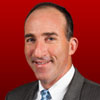Paul Lippe: Pressing ahead and refusing to be terrorized

Paul Lippe.
Editor’s Note: New Normal columnist Paul Lippe was running the Boston Marathon on Monday and offered his reflections Tuesday.
I started the day Monday at the Concord re-enactment of the “shot heard round the world” at the North Bridge, marveling at the courage and resolve of the Minutemen in 1775 who came from the nearby towns of Acton, Carlyle and Concord to challenge the British troops marching from Boston to confiscate weapons.
On the morning of April 19, 1775, there was no clear American identity, no command structure (more of a network, really), and for the minutemen, no particular plan or fallback—just citizens responding to injustice and acting in concert with their neighbors to “do the right thing.” But as the British retreated back into Boston, and militias rose up all along the road to attack and harass them, the Revolutionary War was underway.
A few hours later, I was running in Boston. I am not the fastest runner, and I travel a lot, so I wasn’t especially well-prepared (I ran Boston 30 years ago when I was in law school and was trying to relive a bit of that better-prepared run). So I was slogging painfully down mile 23 when the police told us about the two bombs that had gone off at the finish line (my wife and I had walked around the finish line Sunday night, and also walked around the North End where Paul Revere had started his mission).
Throughout the run, your only thought is to press ahead to the finish. But now the circumstances were very different. Many victims were terribly injured, and three people were killed. First responders were heroically doing their job, modern-day minutemen and minutewomen running toward danger to help others. And runners were running or walking away from the finish, despite months of preparation to get there.
For those who’ve never experienced the Boston Marathon, one of the amazing qualities is the level of civic engagement. First, there’s half a million spectators along the route, ranging from Wellesley students to suburban moms to biker bar patrons, all cheering and supporting the runners. Second, there must be 10,000 volunteers handing out Gatorade and keeping things together. Third, because it requires a fast qualifying time, Boston has many “bandit” runners who are unofficial and by and large a lot slower. The volunteers and spectators are just as gracious to the bandits as the official runners. Fourth, being Boston, there’s a huge presence of doctors and nurses, many of them running to raise money for their institutions and other charities, and there were also several thousand soldiers along the route. Fifth, many runners (especially bandits) are local, but many come from all over the world, and it has a very cosmopolitan feel. And finally, there’s no one who participates who doesn’t feel good about the whole thing.
As President Obama said, at this point we don’t know who set off the explosions or why.
We do know what happened at Oklahoma City and on 9/11. We know that other cultures (including the no-longer-reviled British) have responded to terror with a spirit of “keep calm and carry on.”
We know that the purpose of terrorism is to terrorize, and so the best response is to refuse to be terrorized.
We know that the news coverage was both comprehensive and jumbly, and that social media played a big role, and that we’re moving from a world in which where either officials or cable TV shape the coverage to one where many distributed participants shape the coverage, but we still need public officials to perform their jobs and keep things in focus.
We know there’s no way to be absolutely safe, and yet the last decade has been remarkably free of follow-on terrorist attacks in the US.
We know that resilience is better than fear.
And we know that the same Americans who responded at the North Bridge won’t be defeated by yesterday’s events and will be back in greater numbers for the Boston Marathon 2014.
Paul Lippe is the CEO of the Legal OnRamp, a Silicon Valley-based initiative founded in cooperation with Cisco Systems to improve legal quality and efficiency through collaboration, automation and process re-engineering. Paul ran as a “bandit” this year and in the 1983 Boston Marathon along with a number of other students from Harvard Law School.



